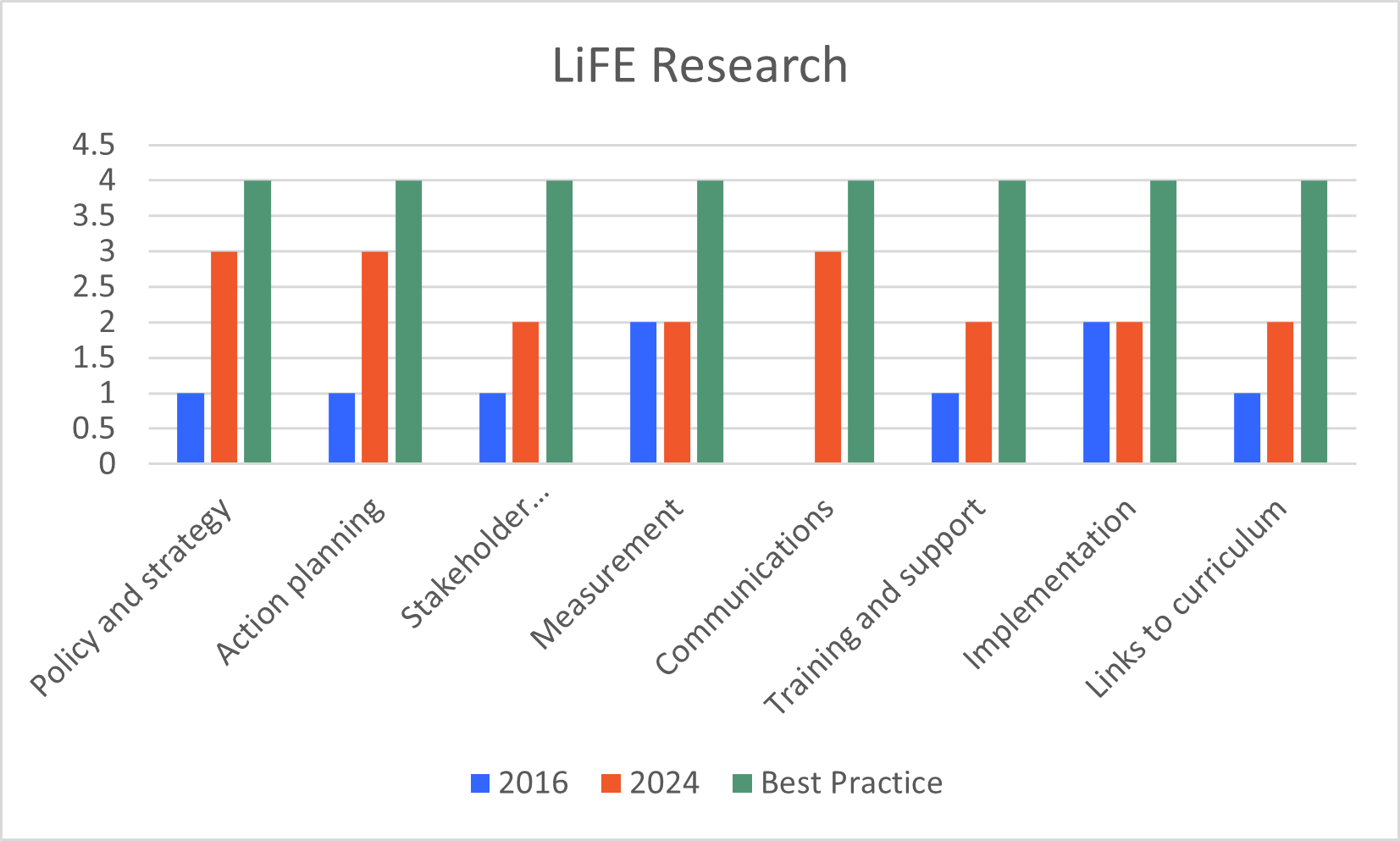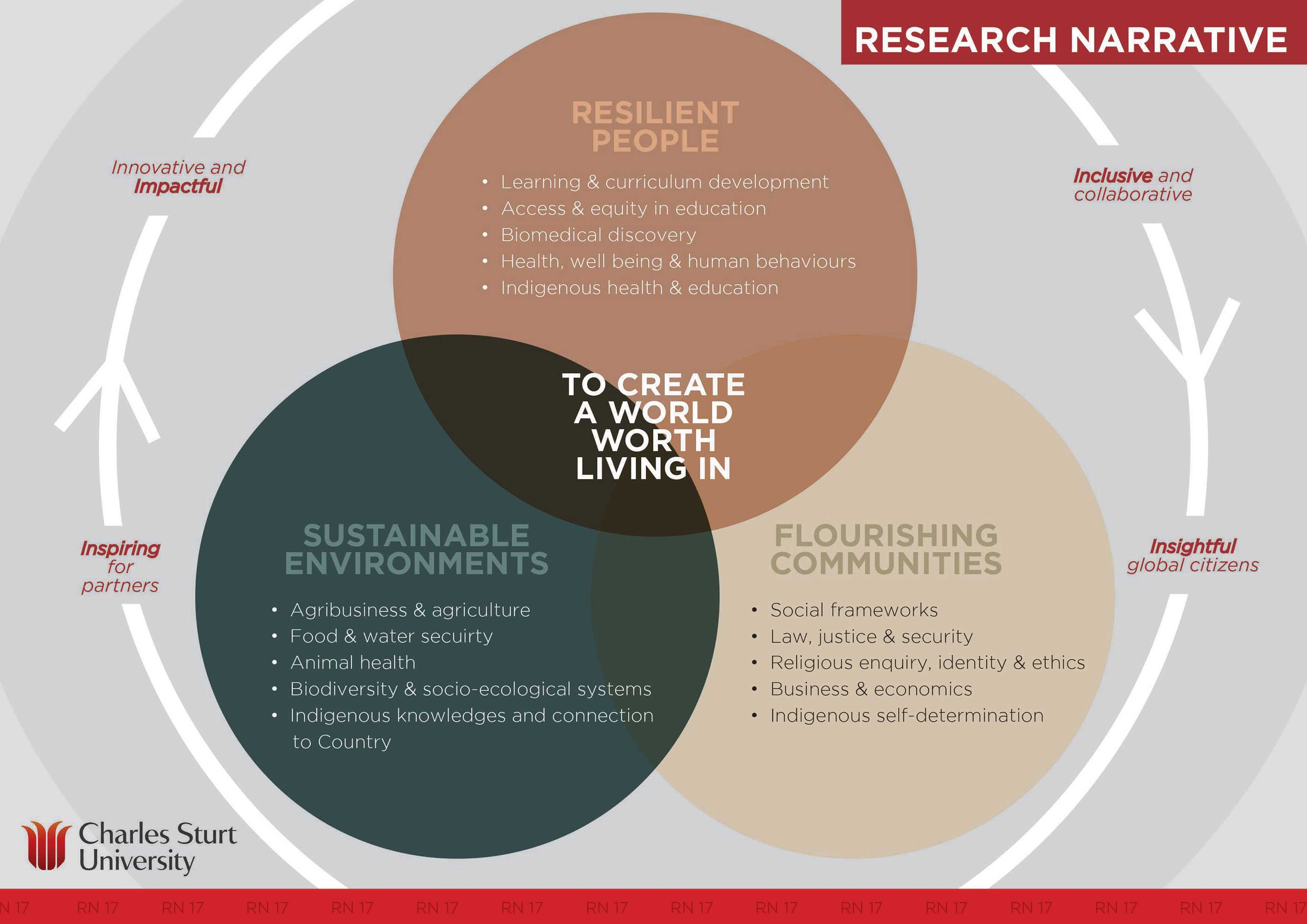Sustainability
- Home
- Locations
- What you can do
- LiFE Framework
- Sustainable Development Goals
- About us
- Grants
- Events
- Contact us
The research framework incorporates two separate but linked activities:
This research is delivered in a way that minimises environmental impacts. For example, running teleconferences rather than traveling extensively, or using of energy-efficient equipment to minimise carbon emissions.
This research progresses, improves or assists the environmental, social, cultural and economic frameworks without detrimental effects. For example, research with a focus on low-carbon technologies or research that investigates some area of sustainability, e.g. attitudes to sustainability, pedagogies for education for sustainable development.
Research conducted by universities and TAFEs drives our global economy, advances in our standard of living and helps us understand the world around us. Integrating sustainability into our research methods can have a huge impact on the behaviours of researchers and ultimately produce more innovative research outputs and outcomes.
For research-intensive institutions, the integration of sustainable research and research into sustainability demonstrates a commitment to new ways of thinking and more sustainable ways to achieve new breakthroughs.
The below paragraph contains information for researchers to include in external applications demonstrating our sustainability credentials.
At Charles Sturt University, we have been initiating projects and processes to improve sustainability across the university since 2007. We have also joined national and international efforts ‒ such as the Talloires Declaration, Learning in Future Environment Index and the UN Sustainable Development Goals ‒ and our Clean Energy Strategy 2030 demonstrates our ongoing commitment to carbon reduction.
And we are getting results. For example, we are the first certified carbon neutral university in Australia (and one of only two in all of Australasia), and we have one of the country’s largest arrays of solar panels across our six campuses.
We have received national recognition for our commitment to sustainability. In 2019 we won the Continuous Improvement category of the Green Gown Awards, and were finalists in the 2020 International Green Gown Awards, being highly commended. Charles Sturt ranked 61 (out of 766) globally in the 2020 Times Higher Education Impact Rankings, with significant category rankings including number four in the world for reduced inequality, sixth in the world for gender equity and the number two university in Australia for climate action.
We believe sustainability is also about promoting best practice and greater understanding across our community. That’s why we have integrated sustainability into all our undergraduate degrees through our Graduate Learning Outcomes strategy, and use tools such as the Sustainability Research Guidelines and Green Labs Checklist to embed sustainability into our Research Narrative.
This framework was benchmarked in 2016. The below graph illustrates our progress towards best practice across the eight (8) activity areas. The green bars reaching four (4) highlight best practice and the lower bars in blue indicate the university's current baseline ratings. An absence of a blue bar indicates 'no progress' for this activity area.

Charles Sturt is implementing best practice in the University's research operations, with the LiFE Framework incorporating sustainable research and research into sustainability.
Sustainability at Charles Sturt in partnership with the Charles Sturt University research community have produced the Charles Sturt University Sustainable Research Guidelines as a result of work implemented across 2018 and finalised in 2019.
The objective of this guidelines are to enable the inclusion of sustainability principles and best practice in all aspects of Charles Sturt University’s research operations.
The guidelines are a key action identified in the Learning in Future Environments (LiFE) Index process to progress Charles Sturt University towards best practice in the Research framework.
The Sustainable Research Guidelines apply to all University staff, students and agents engaged in any research activity attributable to Charles Sturt University. As the university increases its alignment with LiFE best practice, the guide will be updated to enable access to valuable resources outlining sustainable practice.
We believe that this may be the first time a tertiary institution in Australia have developed such a set of guidelines specifically aimed at reducing our environmental footprint associated with our research activities.
Research Seed Grant funding is your opportunity to undertake sustainability-related projects across any discipline and bring sustainability to the forefront of your research. Funding pool of $40,000 with a maximum of $10,000 per project for Charles Sturt University research staff. Find out more about our grants.
Charles Sturt University Research Output (CRO) provides the option to tag outputs against the 17 Sustainable Development Goals (SDG's). This can improve your outputs visibility within the space of sustainability and the SDGs. You can view the SDGs directly on the CRO landing page, and go through to linked content.
For more information on connecting your outputs to the SDGs, contact our CRO Support Team: cro@csu.edu.au
Charles Sturt University researchers have a wide-reaching impact with their research as demonstrated by our research case studies.
Charles Sturt University has developed a Research Narrative to guide our research activity.

to create a world worth living in
Charles Sturt University is operating in a paradigm of research excellence and partnership. We will provide meaningful outcomes for industry, government, business, and communities. We seek to make an impact on our worlds – regional, national and global – and contribute to their economic, social and environmental sustainability and well-being.
Three interdisciplinary research spheres have been identified to encapsulate our research activity, resilient people, flourishing communities and sustainable environments.
This encapsulates research that contributes to the development of educated, healthy, resilient people.
This encapsulates research that contributes to developing communities that will be thriving economically, with strong social frameworks, and where diversity and harmony reside.
This encapsulates research that contributes to the development of sustainable solutions in agriculture and water resources while enhancing the biodiversity of our environments and strengthening ecosystems.
The research spheres are interlocking to indicate the interdisciplinary nature of our research. There will be deliberate cross-fertilisation across the three spheres through collaboration, innovation and co-investment.
Our research is performed in a broader context, and at Charles Sturt, we accept the responsibility to undertake research consistent with our values. In our research efforts we will be
Downloadable copy of the Charles Sturt University Research Narrative 2017
Charles Sturt University aligns our research, policies, procedures, and other work with the UN Sustainable Development Goals (SDGs). These are the most relevant SDGs for this initiative.